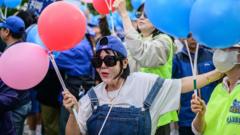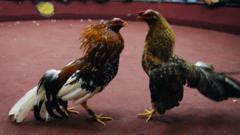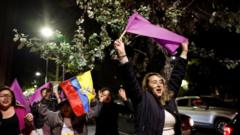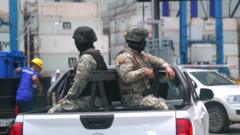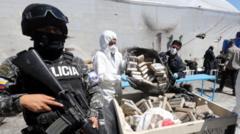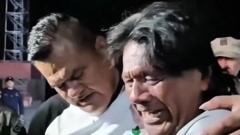In Machala, two candidates vie for leadership as the country grapples with security and economic instability, shaping the future of its citizens.
Ecuador's Presidential Race: A Crucial Decision Amidst Crisis

Ecuador's Presidential Race: A Crucial Decision Amidst Crisis
Ecuadorians in Machala face a critical choice as they prepare for a runoff election, with safety and employment on the line.
In the port city of Machala, notorious for its struggles with drug violence and high unemployment, the mood is tense as residents prepare for a runoff election this Sunday. With the streets often emptying by dusk due to fears of gang violence, voters are polarized between two presidential candidates, Daniel Noboa and Luisa González.
Noboa, the incumbent president and scion of a wealthy banana dynasty, emerged from an unstable political landscape, having previously assumed office after his predecessor's impeachment. He has marketed himself as the candidate capable of restoring safety and economic stability to Ecuador, emphasizing his tough-on-crime stance and readiness to interact with global leaders, including U.S. President Trump.
On the opposing side, Luisa González has positioned herself as the successor to former president Rafael Correa, a figure still celebrated by a significant portion of the population despite his controversial legacy. González’s campaign is rooted in populism and aligns closely with Correa’s policies of the past, which resonate with voters seeking change amidst despair.
As both candidates rally support in the lead-up to the election, they engage with voters who express deep concerns about security and employment—the two pressing issues that have long plagued the nation. In a city marked by shuttered businesses and a fading economy, the upcoming election is more than just a political contest; it represents a pivotal moment for Ecuadorean society.
Ultimately, the choice between Noboa and González reflects not just competing visions for Ecuador's future but a broader struggle for hope within a nation facing daunting challenges. With substantial stakes on the line, Machala's residents and voters across Ecuador will soon determine their path forward.
Noboa, the incumbent president and scion of a wealthy banana dynasty, emerged from an unstable political landscape, having previously assumed office after his predecessor's impeachment. He has marketed himself as the candidate capable of restoring safety and economic stability to Ecuador, emphasizing his tough-on-crime stance and readiness to interact with global leaders, including U.S. President Trump.
On the opposing side, Luisa González has positioned herself as the successor to former president Rafael Correa, a figure still celebrated by a significant portion of the population despite his controversial legacy. González’s campaign is rooted in populism and aligns closely with Correa’s policies of the past, which resonate with voters seeking change amidst despair.
As both candidates rally support in the lead-up to the election, they engage with voters who express deep concerns about security and employment—the two pressing issues that have long plagued the nation. In a city marked by shuttered businesses and a fading economy, the upcoming election is more than just a political contest; it represents a pivotal moment for Ecuadorean society.
Ultimately, the choice between Noboa and González reflects not just competing visions for Ecuador's future but a broader struggle for hope within a nation facing daunting challenges. With substantial stakes on the line, Machala's residents and voters across Ecuador will soon determine their path forward.


